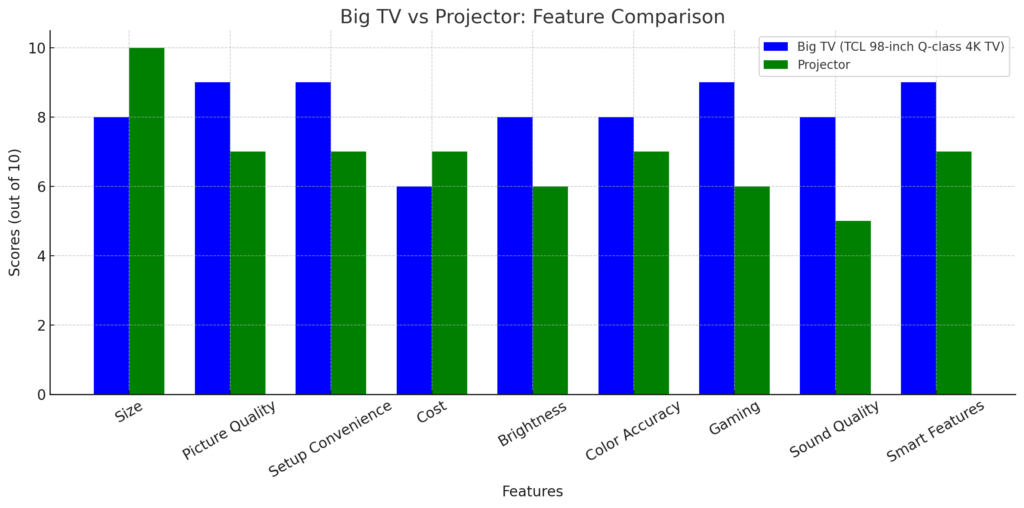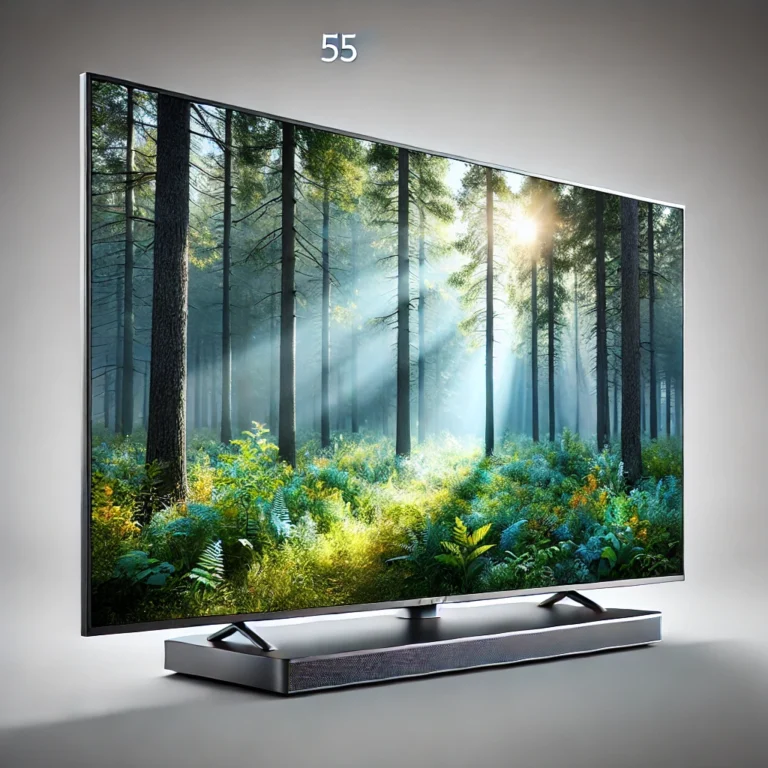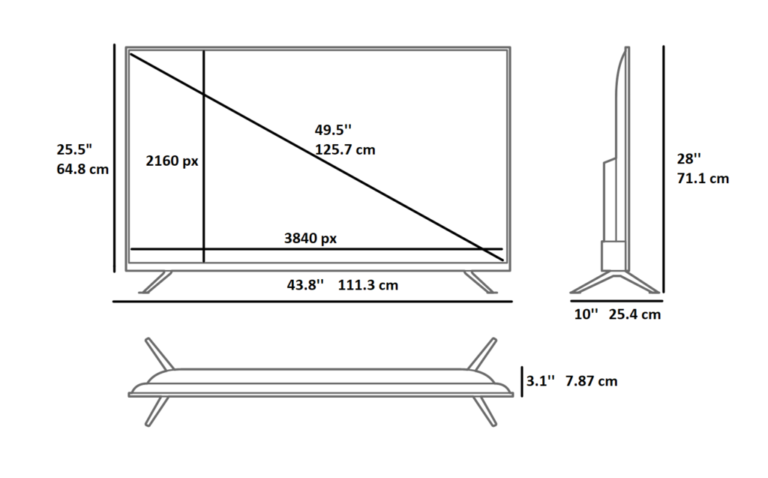Comparing Big TVs and Projectors: The Ultimate Home Theater Showdown
Key Takeaways:
| Pros of Big TVs | Cons of Big TVs | Pros of Projectors | Cons of Projectors |
|---|---|---|---|
| – Large size options up to 100 inches | – High cost, especially for advanced features | – Massive screen sizes up to 200 inches | – Requires dark room for best quality |
| – Superior picture quality with 4K/8K resolution | – Limited maximum size due to cost and space | – Flexible setup in various rooms | – Regular maintenance like lamp replacements |
| – Convenient and easy setup | – Potential glare issues in bright rooms | – More affordable options available | – Lack of built-in speakers necessitates external audio |
The Battle of the Screens: Big TV vs. Projector
The debate between opting for a big TV or a projector for a home theater setup is as relevant as ever in 2024. This analysis delves into the features and benefits of both, using TCL’s latest 98-inch Q-class 4K TV as a case study, juxtaposed with front projection systems.
The Rise of TCL’s 98-inch Q-class 4K TV
TCL’s 98-inch Q-class 4K TV represents a significant advancement in home entertainment technology. With 2300 zones of full-array local dimming and mini LEDs capable of producing up to 2,000 nits of peak brightness, this TV is a game-changer for HDR content, especially with Dolby Vision. The combination of exceptional brightness and size makes it a formidable competitor to traditional projection systems.

Superior Video Processing and Smart Features
Powered by TCL’s third-generation AQ processor, the TV excels in video processing and upscaling, ensuring a crisp and vibrant picture quality. The integration of Google TV as the operating system provides seamless access to major streaming services, adding convenience to the user experience.
A Gamers’ Paradise
Understanding the needs of modern gamers, TCL has equipped the Q-class TV with a 120Hz native refresh rate and settings for motion rates up to 480Hz. Support for ALM, VRR, and AMD FreeSync Premium Pro, coupled with HDMI 2.1 compatibility, makes it an ideal choice for fast-paced, next-generation gaming.
Sound Quality and Connectivity
While the TV’s ARC and eARC capabilities allow for Dolby Atmos soundtracks to be passed onto a home theater receiver, it’s notable that the ARC/eARC input is not HDMI 2.1 enabled. Users can control the TV via the remote or voice commands with Alexa, Google Assistant, and Apple HomeKit. Additional connectivity options like Chromecast and AirPlay enhance the versatility of the TV.
Picture Profiles and Calibration
The TCL TV shines in terms of out-of-the-box color accuracy and grayscale. The movie picture profile, calibrated from the factory, ensures an organic and natural viewing experience. Post-calibration, the grayscale and color accuracy further improve, demonstrating the TV’s capability to deliver a visually stunning performance.
Brightness and Real-World Performance
While the TV claims a peak brightness of 2,000 nits, real-world usage often sees it closer to 1,300 nits. This level of brightness is more than adequate for enjoying both standard dynamic range and HDR content without the need for constant setting adjustments.
Light Uniformity and Viewing Angles
The TCL TV exhibits good light uniformity, although it may not reach the excellence of some competitors like the Hisense 85 UX or Sony X95L. However, it does fall short in off-axis viewing, with noticeable color shifts and posterization when not viewed directly front-on.
Comparing to Other Big Screen Options
In comparison to other large TVs like Sony’s X90L or Hisense’s 100-inch U8 model, TCL’s Q-class TV stands out for its brightness and image clarity. However, it’s important to note that certain features like upscaling might be superior in other brands like Sony.
Projection Enthusiasts vs. Big Screen TVs
While projection enthusiasts argue for the superiority of larger screens, TCL’s 98-inch TV offers a compelling alternative. Its combination of size, picture quality, and advanced features presents a strong case for big TVs in the modern home theater landscape.
Final Thoughts
TCL’s 98-inch Q-class 4K TV marks a significant shift in the home theater experience. It challenges the traditional dominance of front projection systems with its technological advancements and user-friendly features. As 2024 progresses, the battle between big TVs and projectors continues, with TCL’s offering leading the charge in the big TV arena.
FAQs on Big TV vs projectors:
What are the main differences in a projector vs TV setup for home theaters?
- Projectors offer larger screen sizes and flexibility in placement, but require dark rooms for optimal viewing. TVs provide higher brightness, better sound quality, and are easier to set up.
In the debate of TV vs projector, which is more cost-effective for home theaters?
- While projectors can offer larger screen sizes at a lower cost, TVs offer better overall picture quality and convenience for the price, especially at 4K resolution.
What does the projector vs TV Reddit community say about home theater setups?
- The Reddit community often discusses the immersive experience of projectors for dedicated home theaters but acknowledges the superior brightness and ease of use of TVs in mixed-use spaces.
For a dedicated home theater, should I choose a projector vs TV?
- A dedicated home theater can benefit from the large screen and cinematic experience of a projector, especially if you can control the lighting. However, for higher brightness and ease of setup, a TV might be preferable.
How does a 4K projector vs TV compare in terms of picture quality?
- 4K projectors offer large, high-resolution images but may be more expensive. TVs, however, generally provide brighter images with better contrast and are more affordable at 4K resolution.
Is a projector better than a TV for gaming?
- TVs often have better gaming features like higher refresh rates, lower input lag, and more consistent brightness, making them better suited for gaming compared to projectors.





